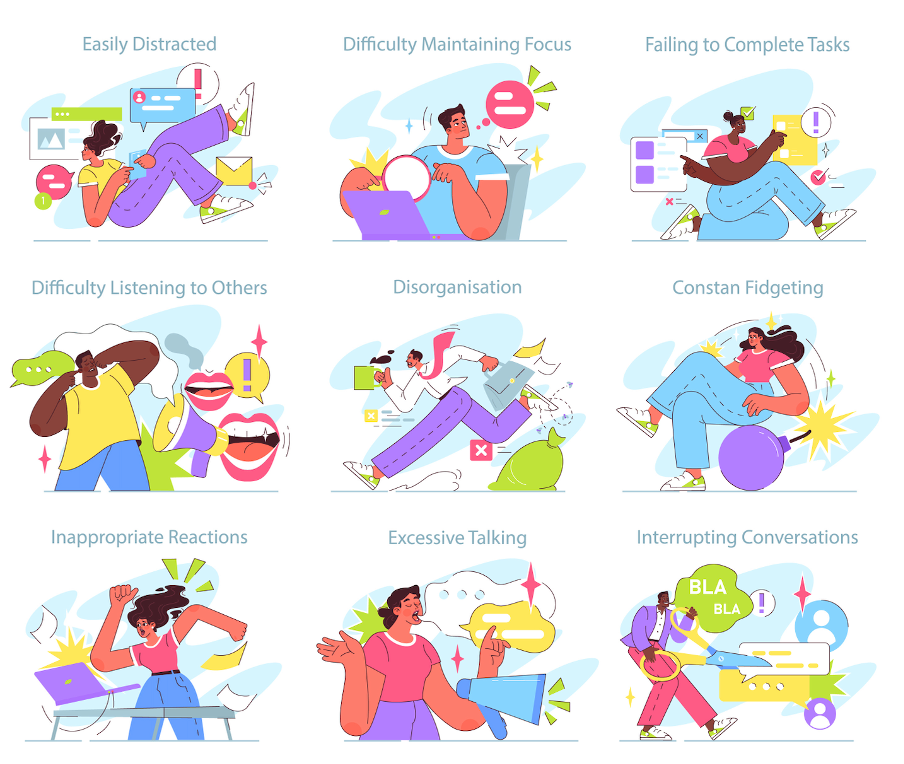What is ADHD?
Attention Deficit Hyperactivity Disorder (ADHD) is a neurodevelopmental condition that significantly impacts an individual’s daily life. The symptoms of ADHD includes significant difficulty with focusing, concentrating, sitting still, organising, prioritising, and getting essential tasks at home, at work or at school completed. Other ADHD symptoms include racing thoughts (mainly about things that need to be done), emotionaly dysregulation and difficulty relaxing.

Girls and Women with ADHD present differently from boys and men. Girls and women are more likely to mask their symptoms and find ways to compensate for their difficulties making it hard for others to notice their symptoms. ADHD symptoms in women can also be expressed through inner restlessness, hyperactive thoughts, and being overly talkative. Girls and women with ADHD are often impacted by hormonal changes and may have a harder time managing their intense emotions. Those with ADHD who also have co-ffumorbid or co-occuring conditions such as anxiety, trauma or depression can make the c worse.
Frequently Asked Questions

1. What does an ADHD assessment involve?
The ADHD assessment process is a comprehensive approach integrating clinical interviews, symptom evaluations, rating scales, behavioural observations, cognitive assessments (usually for children and teenagers) and collateral information. This information is obtained from significant individuals involved in a person’s life. The ADHD assessments are undertaken by our qualified psychologists to reach an accurate diagnosis informing treatment recommendations.
- Clinical Interview: A mental health professional (psychologist, psychiatrist, etc.) will ask detailed questions about your current symptoms, childhood history, medical history, family history, and any difficulties you experience in daily life (work, school, relationships).
- Questionnaires and Rating Scales: You (and potentially parents, teachers, or partners) will complete questionnaires and rating scales to provide information about ADHD symptoms and their impact. The rating scales we typically use for children, adolescents and Adults are Conners Comprehensive Behavior Rating Scales. In certain circumstances we will use other rating scales to assess for executive functioning difficulties.
- Cognitive and Neuropsychological Tests: These may be used to assess attention, memory, executive functioning (planning, organisation), and other cognitive abilities that can be affected by ADHD.
- Observation: In some cases, especially with children, clinicians might observe behaviour in different settings (e.g., classroom) or we will request to speak to the child’s educator. or counsellor.
2. How long does an ADHD assessment take?
To give you a better idea of what to expect, here’s a breakdown of our ADHD assessment process:
It starts with a phone consultation: We’ll discuss your concerns and send you some questionnaires to complete.
Streamlined testing: Thanks to our clinicians’ extensive experience, the in-person testing session is efficient, usually lasting approximately 2 hours.
Prompt feedback: We’ll discuss the results with you right away and provide a detailed written report.
Collaboration for kids: When assessing children, we may reach out to their teacher or counselor to gain a more comprehensive understanding.
3. Who can diagnose ADHD?
Qualified mental health professionals, such as:
- Psychologists: Specifically, psychologists with appropriate training and experience in diagnosing ADHD and providing therapy to individuals who live with ADHD.
- Psychiatrists: Medical doctors specialisng in mental health.
- Developmental Pediatricians: Doctors specialising in child development.
- Some Family Doctors: Some general practitioners may have training in ADHD diagnosis, but in Australia they are often refered to specialists for comprehensive assessments.
4. What are the criteria for diagnosing ADHD?
Diagnosis is based on established criteria, such as those in the Diagnostic and Statistical Manual of Mental Disorders (DSM-5). These criteria include:
- Inattention: Difficulty sustaining attention, forgetfulness, disorganisation, easily distracted.
- Hyperactivity-Impulsivity: Fidgeting, restlessness, difficulty staying seated, interrupting others, acting without thinking.
- Symptoms present before age 12: Even if diagnosed as an adult, symptoms must have been present in childhood.
- Symptoms present in multiple settings: (e.g., home, school, work).
- Symptoms causing significant impairment: In daily functioning.
We’ll also explore areas like executive functioning skills, any history of trauma, and the presence of Autism or other mental health concerns such as anxiety, depression and personality disorders. This allows us to make a precise diagnosis and create a tailored plan that addresses all of your needs.
5. What are the costs involved?
We understand that seeking an ADHD assessment can be a significant financial commitment. At Psychcare, we strive to make our services accessible to everyone. Our fees are generally lower than most psychology clinics, while still ensuring our clinicians are fairly compensated and our practice can continue to provide high-quality care. The cost of the assessment includes time spent directly with the client as well as the assessment preparation, scoring, interpretation and report writing.
ADHD ASSESSMENT SCHEDULE OF FEES
Children and Adolescent
| Service Description | Time spent directly with the client | Cost |
| Child and Adolescent ADHD assessment and a Cognitive (IQ) assessment | 1-2 hours | $1080 |
| Child and AdolescentADHD assessment + cognitive assessment + an Educational or an Academic Achievement Test. | As required | $1330.00 |
| Child and AdolescentADHD assessment and Autism Assessment | 2 hours for observation and clinical interview | $2680 |
| Child and AdolescentCognitive Assessment Only ( Testing of Intellectual Ability such as Intellectual Disability or Giftedness) | 1-2 hours | $825 |
| Other document preparation and completion (e.g NDIS forms, Centrelink, Insurance) | $250 |
Adult
| Service Description | Time spent directly with the client | Cost |
| Adult ADHD assessment which includes initial consultation, written report and feedback | 75mins clinical interview | $580.00 |
| Adult ADHD Assessment + cognitive assessment. These assessments are for individuals who are still attending school or tertiary studies | As required | $1080 |
| ADHD and Autism Assessment | 1.5-2hrs | $2380 |
| Other document preparation and completion (e.g NDIS forms, Centrelink, Insurance) | As required | $250 |
NB: The client contact time represents the time spent directly with the client and does not inlcude pre-assessment questionnaires, scoring, interpretation and subsequent analysis and report writing which are conducted separately.
6. What happens after an ADHD diagnosis?
If ADHD is diagnosed, the clinician will discuss treatment options, which may include:
- Medication: We can discuss the potential benefits of medication, both stimulants and non-stimulants, as part of your treatment plan. If you decide to consider medication, we’ll collaborate with your general practitioner and recommend a referral to a specialist (eith a psychiatrist or a pediatrician) who can prescribe stimulants.
- Therapy: Behavioural therapy, cognitive-behavioral therapy (CBT), or other therapy approaches to address challenges related to ADHD. If there are other issues such as trauma or dissociation, it would also be important to work through this. Addressing trauma through therapy can help you develop coping skills for managing emotional flashbacks, triggers, and hyperarousal, which can significantly improve ADHD symptoms as well
- Work arounds: Strategies for improving organisation, time management, and coping with ADHD symptoms.
- Lifestyle changes: Regular exercise, good sleep hygiene and eating healthy food can signficantly improve ADHD symptoms.
- Educational Support: Accommodations and support services in school or the workplace.
7. What if I suspect ADHD in my child?
If you suspect ADHD in your child, it’s important to talk to their pediatrician or a mental health professional. They can conduct an assessment and provide guidance on appropriate interventions and support.
Where to find more information:
- CHADD (Children and Adults with Attention-Deficit/Hyperactivity Disorder): chadd.org
- ADDitude Magazine: additudemag.com
- National Institute of Mental Health (NIMH): nimh.nih.gov
- ADHD Australia:adhdaustralia.org.au
- ADHD Foundation Australia:adhdfoundation.org.au
Click the link for information on our schedule of fees for a cognitive assessment, Educational Assessments, Children and Teenagers Autism Assessments and Adult Autism Assessments.
